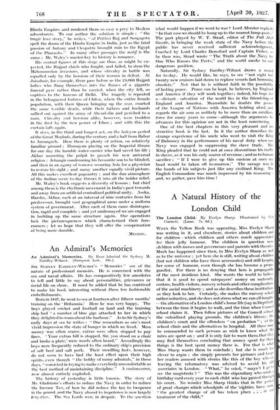A Natural History of the London Child
WHEN the Yellow Book was appearing, Miss Evelyn Sharp was writing in it, and elsewhere, stories. about children and for children-- which children and others much appreciated for their jolly humour. The children in question were children with nurses and governesses and parents with theorie. Much has happened since then, to .Miss Evelyn Sharp as well as.to the universe ; yet here she is still, writing about children (but not children who have these aCeessories) and still keeping her sense of humour, even though she has become a propa- gandist. For there is no denying that hers is propaganda of the most insidious kind. She wants the world to believe that it is good to spend ratepayers' money on maternity centres, health visitors, nursery schools and other complication of the social machinery ; and so she describes these institution,
as they look to her. Certainly, she makes the nursery school rather seductive, and she does not stress what we can all imagine —the alternative of a London child's home life (say in Deptford) between the time it begins to walk, and the time when Council school claims it. Then follow pictures of the Council school: the subsidized playing grounds, the children's library, the
children's court and the offenders on probation " ; of the school clinic and the alternatives to hospital. All these milY be commended to such persons as wish to know what the rates are spent on ; and it is only fair.to warn them.that they may find themselves concluding that money spent for 6(4 things is the best spent money there Ls. For that is whist Miss Sharp wants them to conclude ; but she is Much toe clever to argue ; she simply presents her pictures and keep' her readers amused with stories like this of the boy who on leaving the reformatmy was advised to avoid his old associates in London. • "What," he cried; " mayn't. I go t" see the magistrate ? " This was the stipendiary who sends " birthday card every year to each child who hisa'pOsted through his court. No wonder Miss Sharp thinks that in the Feried, of great changes which schoolgirls of the 'eighties. have seen. "the greatest change of all has taken place ; ; in °tit treatment of the child.".










































 Previous page
Previous page